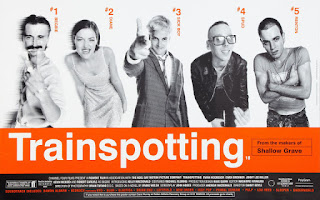"So what have you been up to for the past 20 years?"
What have any of us been up to? Surely Trainspotting wasn't 20 years ago? Curse you, linear progression of time. In 1996, John Major was the prime minister, it was the age of Britpop, Dolly the Sheep had just been cloned, the Spice Girls were starting out, and Trainspotting became the highest grossing British film of the year.
 |
| When I was younger... |
What results is that most unusual of things - a great sequel, aware of its roots, and keen to continue the story it started and add a bit. Everything is the same but different, from the characters to the city itself. You can see it's 1996 self, but it's not quite that anymore. Renton, Sick Boy, Begbie and Spud are now Mark, Simon, Francis and Murphy. They're pretty much where we expect them to be. Mark is now clean, still running, but its a more sedate pace on a treadmill rather than the run-for-your-life of the original. He moved to Amsterdam, and has been there since 1996, coming back only because life has demanded it. Francis is in prison, denied parole, planning an escape by self injury and banking on the incompetence of
 |
| So much younger than today... |
Like it or not, age has changed them all, and when they try to recapture the people they once were, it doesn't quite work. They can't quite run as fast or for as long. Their bodies are letting them down. The next generation are unfathomable. The city doesn't quite feel like the one they knew. The worst toilet in Scotland is no longer acceptable to them (although there still "gross out moments" with explosive vomiting from the outset).
And from this, quietly, our allegiances change and we find ourselves rooting for Spud. He changes the least but changes the most. In being the ultimate loser, he becomes the ultimate winner. He accepts himself, he accepts his life, and he finds peace in it where the others do not. And he gets the ultimate Danny Boyle trope - the offer of all the money, which he rejects it because it means nothing to him.
I'll be honest, I don't love Trainspotting. I can appreciate it, but it didn't quite hit at quite the right point in my life. But I very much enjoyed T2. It's an ode to friendship, age, reconciliation and nostalgia. And there are a lot more trains than in the first film.
Additional thoughts, comments and questions:
- Francis has been in prison for 20 years, but has an 18 year old son. Has he just not added up those numbers? He seems too volatile not to have thrown the fact in his wife's face if she had an affair.
- The two instances of defiance to Francis are interesting to me. He rejects his son's lifestyle, and actively taunts him to become violent, but turns to grudging respect when his son faces him down. Likewise, Francis openly mocks the idea that Spud has turned to writing, but becomes actively involved - almost happy - when Spud offers to read his stories out to him.
- The women in this film are secondary characters, but they very much shape and influence the protagonists, and the plot. They support the characters where possible, but are careful not to get sucked into the chaos (such is the life of those affected by the habitual drug user). Gail removes herself (and little Fergus) from Spud's life, but remains on hand at a distance to offer support, read his manuscripts and house his belongings. Mark's mum is notable by her absence, an actual shadow which Mark and his father are acutely aware of and brought together by. She has kept Mark's room as it once was, but didn't make contact over the years. Diane is not where Mark left her, but she does offer her professional advice at a "very reasonable" hourly rate, asks after him cordially but nothing more. Veronicka constantly shapes her own future, and nudges Simon to do likewise but recognises him (and Mark. And Spud for that matter) for what they are and exits. June knows better than to attempt to argue or reason with Francis, so waits for him to burn off all his angry energy and slope off. They initially seem like the passive characters of the film, but it quickly becomes apparent that they are just not reacting to the chaos anymore, and as such keeps themselves (and those around them) sane and safe.
- As always, Danny Boyle's films are instantly recognisable by their style and soundtrack. And in keeping with the theme of the film, both are current with a heavy dose of nostalgia. I particularly liked the slow, instrumental version of Perfect Day, Mark starting (and then stopping) Lust for Life, and Silk (Wolf Alice).
- Life mimics art:


No comments:
Post a Comment